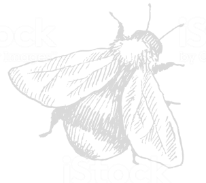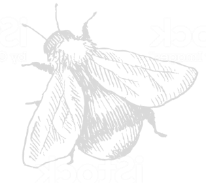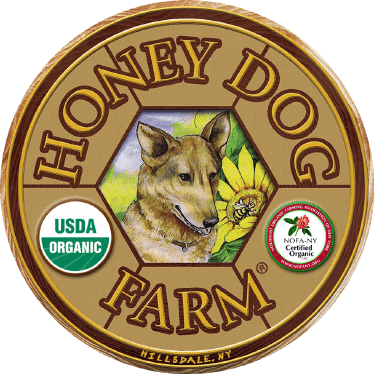Edit Account Details
Bees on Honeydog Farm


Here at Honey Dog Farm we not only believe, but know, that all species living on this planet are connected. When one suffers, inevitably, we all do. That’s why we are cultivating honey bees so that these unsung heroes of the natural world will continue to thrive and provide us with the means to continue to produce food for ourselves. Consider that the humble honey bee is responsible for more than 75 % of the food that we produce and consume each year. This is because most fruits and vegetables need the bee to assist with pollination. They also pollinate the hay and clover which is fed to cattle, as well as cotton and flax which is used to produce a wide variety of products that we use each day. Without the honey bee, our way of life, and the life for other creatures on the planet, will suffer.
Less than 12 years ago the honey bee could be found in most states in the U.S. and Canada. Now, there has been an 87% loss in all areas, and only 13 states, and one province in Canada now have bees. The loss of pollinating bees is a global issue, as well. The decline is so alarming that 7 species of the tiniest of bees, which does the work of 50 men proportionately, has been listed on the endangered species list. Here at Honeydog Farms, we’re doing our part to provide both the habitat and cultivation to offer the honey bee a chance to do what it loves to do best . . . work. Join us in helping the honey bee to make a comeback.



Ways You Can Help Save The Bees
Plants for Bees
Bees love plants that offer a good supply of sugar-laced nectar, as well as a type of protein-rich pollen. Many types of plants can offer this, but there are clearly some top contenders that provide both, and in vast quantities. Try to plant as many of these as possible to encourage the honey bees to visit frequently. What’s in it for you? Aside from the beauty of the flowers and plants themselves, you will be rewarded with a greater yield in your crops, larger blooms, and less pests.
- Milkweed
- Purple Coneflower
- Sunflowers
- Yarrow
- Blue Hyssop
- Mint (of any variety)
- Asters
- Goldenrod
Be careful where you purchase your flowers or seed, however. Those plants that are purchased and have been ‘protected’ will often have neonicotinoids, which are a type of pre-treatment with chemicals that many producers use. These can cause trouble for the bees, so plan to only purchase organic seed or flowers from smaller nurseries that offer chemical free plants.


Buy Locally
Did you know that honey produced in your ‘neck of the woods’ has healing properties? Scientists now agree with what beekeepers have known for centuries: honey has medicinal value. Consider that the honey produced locally contains pollen from the area. Those who consume honey made from local bees will build up a tolerance for that pollen, meaning that allergies will diminish. Honey purchased from store shelves may be shipped in from vast differences where the pollen is quite different (if it is real honey at all!). Buy local honey . . . your nose (and your body) will thank you.
Weeds are Not All Bad
There is a Native American tale whose main moral is to assure the people of the Earth that for every disease and problem mankind has, there is a plant to cure it. This, as the tale goes, is an ancient promise that the plants made to the Creator in order to protect the newest of creations . . . mankind. Whether you believe it or not, those weeds that you love to hate . . . may actually be beneficial, not only medicinally, but for the honeybee. Consider that lawns and gardens that are allowed to have a few weeds provide shelter and nutrition for pollinators, and they can still look green and lush. Do your part by providing some ‘wild spaces’ in your garden or yard. The bees, butterflies, and lady bugs will thank you!


Become a Beekeeper
Even if you don’t want to dive headlong into the interesting hobby of keeping bees, you can still be a beekeeper by providing a habitat that the bees prefer, limiting or eliminating the pesticides that you use, and allowing more ‘wild’ places to thrive in your area. Those who wish to pursue the vastly rewarding hobby of beekeeping, and are lovers of all things honey, will need to assess a few factors before beginning. First, and for most make sure you and those around you are not allergic to bees. Do you have a good place for the bees? Bees prefer to have access to water, be in an area where there is not a lot of traffic or disturbance, and there are easy sources of food readily available. When you are ready, then it is a simple matter of purchasing the bee hives (most can be obtained as kits), selecting the type of honey bee, and obtaining the necessary beekeeper equipment. The best thing you can do before starting is to locate and contact your local beekeeping club. Working alongside someone who is already an established beekeeper can help you avoid some of those newbie mistakes that so often kill honeybees their first year.
